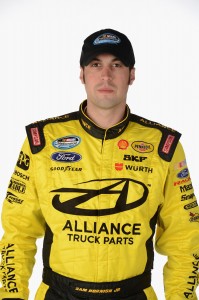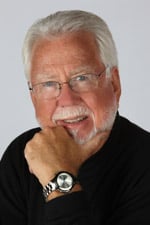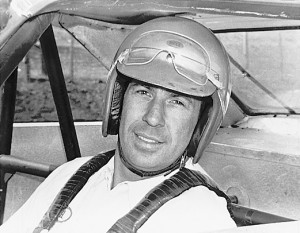
In NASCAR’s rough and tumble era of the 1950s and 1960s, Hall of Fame inductee Ned Jarrett stood out due to his understated personality and polite demeanor. Perhaps that’s why the media often referred to him as “Gentlemen Ned” and looked at him as one of the sport’s original statesmen.
After winning two Cup championships, Jarrett shocked the racing world by retiring in his prime. He went on to have a stellar broadcasting career and gained additional notoriety as Cup champion Dale Jarrett’s father.
These days, Jarrett enjoys reminiscing over his glory days on the track and a faith movement that he helped pioneer.
In this Inspiring Athletes conversation, Jarrett talks about his beginning in the sport, the prevalent nature of moonshine during those early days and how faith has evolved amongst the NASCAR community:
Chad Bonham: How did you first get interested in stockcar racing?
Ned Jarrett: My dad had taken me to some races in the area here (in Newton, North Carolina) at some dirt track events and made a racing man out of me. Then they started building a track about eight or 10 miles from the farm (in Hickory). It was a big thing for the community because there were very few forms of entertainment. You had a couple movie theaters in town and high school sports and that was about it. Having a racetrack, that was a big thing. You’d go down to the country store on a rainy day when you couldn’t work on the farm and these farmers and saw millers would be sitting around talking, “Boy, wait ‘til they get that thing built. I’ll go up there and show ‘em how to drive.” Secretly I thought, “Wow, I want to do that.”
Bonham: How aware were you of the moonshine connection within the sport?
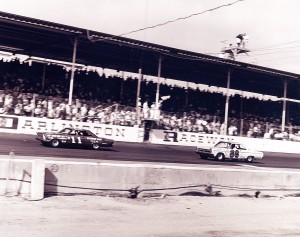
Jarrett: Once I got into racing, I knew of people who were involved. In fact, it seemed like back in those days, a big percentage of the drivers were involved in moonshine, one way or another. That’s one of the reasons why my dad did not want me to drive racecars. He didn’t think that it would be good for the image that he had worked so hard to build his family and the respect that he tried to build in the community. He couldn’t see where my participation with the moonshiners could add to the image that he had worked so hard to build. He felt like it might tear down the image. He wasn’t against those people. There were a lot of good people who were involved in moonshine. They worked hard at it. He didn’t talk against them, but he didn’t want his sons involved in it. There was a reputation that came with (moonshine). And the biggest part of that reputation was they were doing something that was against the law. They were breaking the law. I don’t know that my dad or anyone else looked at them as big sinners. They just had a different way of making a living. For some of them, it was the only way they knew. It was just something that sort of accepted. It’s not that my dad wouldn’t associate with them, but he just didn’t want me involved in a sport that didn’t have a very good image back then, especially when so many of the participants were involved in moonshine.
Bonham: You were one of the few outspoken Christians during the late 1950s and early 1960s. What was the atmosphere like within the sport for you and other believers?
Jarrett: I never felt any animosity as a result of being a Christian. I never tried to hide the fact that I was a Christian but I also didn’t try to push it on anyone else. Whatever beliefs they had, that was their business and the beliefs that I had was my business. I never felt that anyone felt badly towards me because I was a Christian. I didn’t try to hide it, but I didn’t try to get up and preach because I wasn’t capable of doing that. I don’t think God put me on the earth for that or He would have led me in a different direction.
Bonham: Why did you retire at such a young age?
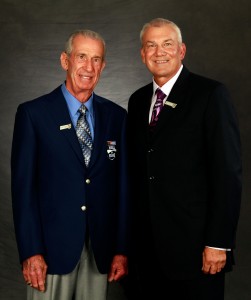
Jarrett: There were a number of reasons that I got out as early as I did. One was that I vowed to myself early on that however far up the ladder I got, I would quit while I was there and not go down the other side. People have a tendency to remember the last thing you did and I didn’t want them to remember me as a has-been. Also, we didn’t know how long we could continue to race and how old we could be and continue to race and be effective. We were comparing ourselves to athletes in other sports. You get in your mid-30s and you start losing some of that athletic ability. I was 34 and although I felt like I still had some years left in me, I had broken my back the year before in ’65, but I continued to drive through that and won the championship. I don’t say that boastfully but that’s the way it was. I felt physically fit to continue on in ’66 and then Ford pulled out and it made me step back and take a look at the lack of security there was in the sport, for one thing. I was also missing out on a lot of things that my children had going on in their lives and I wanted to be a part of it. My daughter (Patti) was six years old. Dale was nine years old. My oldest son Glenn was fifteen. They were at the stages of their lives where they had a lot of things going on. I couldn’t be a part of their lives as long as I was running all over the country driving race cars. That factored into it as well.
Bonham: How would you compare your era to the current era where so many young drivers are openly sharing their faith?
Jarrett: It’s very different from when I was driving but it’s very refreshing. I love to see it. I happened to be at Daytona when Trevor Bayne won. I went to Victory Lane and I’d never met him. It’s great to see that. It certainly is a sharp contrast to the days when I was racing. But you’ve got a different platform now then we had back in those days. There was no television and very few media members that were there and those media members were either not Christians or they didn’t talk about it either and they wouldn’t write about it. I don’t recall many stories that were written about me being a Christian while driving racecars. What little that was written about the sport back then, they would write about what the driver was doing on the racetrack. There were some complimentary articles written about me being a family man and those kinds of things over the years, which I really appreciated. But as far as digging deep into my faith, I don’t recall much of that going on.
Bonham: Why do you think NASCAR has become so friendly and open to the idea of public expressions of faith and ministry at the track through organizations like Motor Racing Outreach?
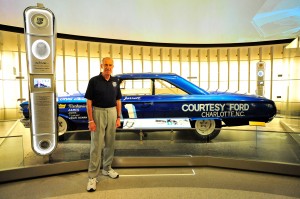
Jarrett: The sport has always been pictured as a family sport, starting with the France family. I think the family image has been and has become even more important to NASCAR as years have passed. If the families are made up of down-to-earth type people—fun-loving, God-fearing people—then I think that has certainly helped. That image has grown and NASCAR is more interested now in seeing it grow more. I think they like that and they should. I feel that has helped to open doors for Christianity and faith in the sport. It’s good to see that (NASCAR is) actually encouraging the things that go on in the sport and the work that God’s doing in the sport.
This is a just a small portion of a longer interview conducted with Ned Jarrett for an upcoming Judson Press book called Faith in the Fast Lane set to release in January of 2014. This book chronicles NASCAR’s rich faith story and include additional commentary from legendary drivers such as Richard Petty, Bobby Allison, Mark Martin, Bobby Labonte, Darrell Waltrip and Phil Parsons.
